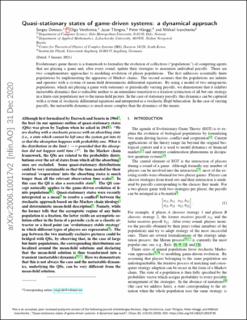Quasi-stationary states of game-driven systems: A dynamical approach
Journal article, Peer reviewed
Accepted version
Permanent lenke
https://hdl.handle.net/10642/9867Utgivelsesdato
2020-12-28Metadata
Vis full innførselSamlinger
Originalversjon
Denysov S, Vershinina O, Thingna, Hanggi P, Ivanchenko M. Quasi-stationary states of game-driven systems: A dynamical approach. Chaos. 2020;30:123145 https://doi.org/10.1063/5.0019736Sammendrag
Evolutionary game theory is a framework to formalize the evolution of collectives (“populations”) of competing agents that are playing a game and, after every round, update their strategies to maximize individual payoffs. There are two complementary approaches to modeling evolution of player populations. The first addresses essentially finite populations by implementing the apparatus of Markov chains. The second assumes that the populations are infinite and operates with a system of mean-field deterministic differential equations. By using a model of two antagonistic populations, which are playing a game with stationary or periodically varying payoffs, we demonstrate that it exhibits metastable dynamics that is reducible neither to an immediate transition to a fixation (extinction of all but one strategy in a finite-size population) nor to the mean-field picture. In the case of stationary payoffs, this dynamics can be captured with a system of stochastic differential equations and interpreted as a stochastic Hopf bifurcation. In the case of varying payoffs, the metastable dynamics is much more complex than the dynamics of the means.
